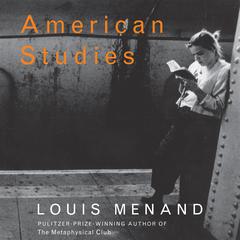 Play Audiobook Sample
Play Audiobook Sample
The Marketplace of Ideas: Reform and Reaction in the American University Audiobook
 Play Audiobook Sample
Play Audiobook Sample
Quick Stats About this Audiobook
Total Audiobook Chapters:
Longest Chapter Length:
Shortest Chapter Length:
Average Chapter Length:
Audiobooks by this Author:
Publisher Description
Has American higher education become a dinosaur? Why do professors all tend to think alike? What makes it so hard for colleges to decide which subjects should be required? Why do teachers and scholars find it so difficult to transcend the limits of their disciplines? Why, in short, are problems that should be easy for universities to solve so intractable? The answer, Louis Menand argues, is that the institutional structure and the educational philosophy of higher education have remained the same for one hundred years, while faculties and student bodies have radically changed and technology has drastically transformed the way people produce and disseminate knowledge. Sparking a long-overdue debate about the future of American education, The Marketplace of Ideas examines what professors and students—and all the rest of us—might be better off without while assessing what is worth saving in our traditional university institutions.
Download and start listening now!
"The first part of Louis Menand's latest book is a summary of richer and more detailed sources (e.g., John Thelin's excellent overview of the history of higher education). However, the second part--which raises questions about the ideological makeup of the liberal arts professoriate (the real problem, it seems, is that the academy is filled with mainstream liberals and few radicals of any stripe) and the training of graduate students (Menand argues that eight years of benign neglect in a Ph.D. program is a pointless and futile exercise)--is quite compelling. Plenty of other scholars have already made similar claims, but Menand is an excellent and very persuasive writer, and the Marketplace of Ideas is short enough to justify at least a cursory skim from anyone interested in this subject."
— Oliver (4 out of 5 stars)
Quotes
-
“Menand…provides a smart, succinct, splendidly written summary of the back story and current state-of-play in education in the liberal arts at the country’s elite institutions.”
— Boston Globe -
[Menand] has the rare ability to tackle complex subjects and make them comprehensible and readable.
— Philadelphia Inquirer -
“[Menand] has the rare ability to tackle complex subjects and make them comprehensible and readable.”
— Philadelphia Inquirer -
“Part history of higher education, part sympathetic but insistent argument for change, Menand’s book is a worthy and admirably succinct exploration of why colleges are so difficult to improve.”
— Washington Monthly -
“Michael Prichard’s stern, sonorous voice is a perfect match for Menand’s critical exploration of the contemporary university.”
— AudioFile -
“An important…view on the content of higher education.”
— Library Journal
The Marketplace of Ideas Listener Reviews
-
" I was urged to read this before taking another step. Somehow I am still excited to move forward. "
— Neena, 1/23/2014 -
" I guess my expectations were a little too high after having read "The Metaphysical Club." Menand's writing is still brilliant, but the content presented here just wasn't nearly as fascinating as the personalities developed in his earlier work. As always, though, Menand presents insightful and nuanced opinions about complex and divisive subjects. For those interested in the liberal arts in higher education, it's well worth a read. "
— Alex, 1/16/2014 -
" Pretty good history of the way things are in academia. Not a lot of insight into what needs to change. Kind of an inside-the-lines sort of thinker. "
— Josh, 1/11/2014 -
" The most interesting parts of this book were the sections on the professions and "interdisciplinarity" (which I run into a lot in my clients' work - it has replaced "post-structualist" as the buzzword du jour in academe) and Part 4 about why professors seem to think the same way. In my work as an editor of dissertations and scholarly articles (with the occasional PhD application essay thrown in there), I hear a lot of horror stories about doctoral candidates forced to stay in their programs for years beyond when they should be finished or just let go from the program. Menand's point about the self-interestedness of departments in keeping ABD's and doctoral candidates going was very well taken, though I disagree that PhDs should be easier to get, having seen the rigor-less pablum that sometimes passes for dissertation research. I have read probably over 100 dissertations in all types of subject matter in the eight years I've been editing professionally, and I would say a good percentage of them (maybe 15-20%) are just trash, but they get passed because the candidate is doing research that his or her advisor is interested in or wants to appropriate for his or her own purposes or that somehow justifies the committee's political or social beliefs. Few solutions are offered, but I think anyone going into a graduate program, whether in the humanities or any of the social or "hard" sciences, would do well to read this little book and think about what he or she hopes to accomplish. "
— Villate, 1/2/2014 -
" Nothing earth-shattering here, but useful for younger academics in terms of the history of interdisciplinarity and other current buzzwords and problems in higher ed today. Some really depressing statistics, too. Not really wise to read if you're attempting to finish a doctoral program. "
— Katherine, 11/29/2013 -
" Confirming what I already knew... "
— Lauren, 8/14/2013 -
" I especially enjoyed "Problem of General Education" and why faculty are resistant to change. Also, why in the world does a PhD in Humanities take 11 years???? "
— Dawn, 6/3/2013 -
" Great read. Interesting subject. It is part of a collection of books called Issues of our times. Take your time with at 150 pages seemed 300 to get the point. "
— Daniel, 12/1/2012 -
" Much of Menand's assessment of the issues in the US university rings true, and yet his proposals for reform strike me as awfully narrow. The book provides interesting food for thought, especially in contextualizing the current situation, but few real avenues for change. "
— Kathleen, 9/6/2012 -
" This book finally made clear to me the questions I've had about what the study of English is, where postmodernism, deconstructionism, and many of the arts' other anxieties come from. "
— Nick, 11/28/2011 -
" I enjoyed reading it, but Menand seems to hold back relative to his usual forceful writing. Pretty much worthless to people outside the academy, I'd guess. "
— David, 2/21/2011 -
" Much of Menand's assessment of the issues in the US university rings true, and yet his proposals for reform strike me as awfully narrow. The book provides interesting food for thought, especially in contextualizing the current situation, but few real avenues for change. "
— Kathleen, 11/30/2010 -
" I enjoyed reading it, but Menand seems to hold back relative to his usual forceful writing. Pretty much worthless to people outside the academy, I'd guess. "
— David, 7/12/2010 -
" Great read. Interesting subject. It is part of a collection of books called Issues of our times. Take your time with at 150 pages seemed 300 to get the point. "
— Daniel, 4/20/2010 -
" This book finally made clear to me the questions I've had about what the study of English is, where postmodernism, deconstructionism, and many of the arts' other anxieties come from. "
— Nick, 4/16/2010 -
" I especially enjoyed "Problem of General Education" and why faculty are resistant to change. Also, why in the world does a PhD in Humanities take 11 years???? "
— Dawn, 2/27/2010
About Louis Menand
Louis Menand is professor of English at Harvard University and a staff writer at the New Yorker. His books include The Metaphysical Club, which won the Pulitzer Prize in history and the Francis Parkman Prize from the Society of American Historians. In 2016, he was awarded the National Humanities Medal by President Barack Obama.
About Michael Prichard
Michael Prichard is a Los Angeles-based actor who has played several thousand characters during his career, over one hundred of them in theater and film. He is primarily heard as an audiobook narrator, having recorded well over five hundred full-length books. His numerous awards and accolades include an Audie Award for Tears in the Darkness by Michael Norman and Elizabeth M. Norman and six AudioFile Earphones Awards. He was named a Top Ten Golden Voice by SmartMoney magazine. He holds an MFA in theater from the University of Southern California.







